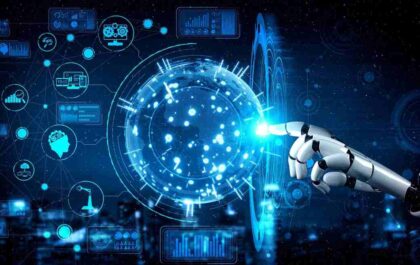Table of Contents
Introduction
Smart technology is evolving faster than ever, transforming the way we live, work, and interact with the world around us. From artificial intelligence (AI) and the Internet of Things (IoT) to robotics and 5G connectivity, 2025 is shaping up to be a defining year for innovation. At SmartTechCrunch, we explore how these advancements are not only improving convenience but also reshaping industries and daily life.
1. The Rise of AI-Driven Experiences
Artificial Intelligence continues to dominate the tech landscape. In 2025, AI is expected to become even more integrated into everyday tools — from personal assistants like Alexa and Google Assistant to advanced business automation systems.
AI is no longer limited to data analytics or customer support. Now, it’s driving smarter healthcare diagnostics, predictive maintenance in industries, and personalized shopping experiences. Imagine walking into a retail store where the AI system recognizes your preferences and recommends products tailored just for you. That’s not a distant dream — it’s the new reality of smart technology.
2. Smart Homes Are Becoming Smarter
The smart home market is expected to exceed $170 billion by 2025, according to industry reports. Devices like smart thermostats, intelligent lighting, and voice-controlled security systems are becoming mainstream. But the future is about interconnected smart ecosystems — where devices communicate with each other seamlessly.
For instance, your refrigerator could notify your grocery app when you’re low on essentials, and your car’s GPS could sync with your home thermostat to adjust the temperature right before you arrive. This deep level of automation will define the smart living experience of the next generation.
3. The Internet of Things (IoT) Will Rule Connectivity
IoT will remain the backbone of smart technology innovation. By 2025, more than 30 billion IoT devices are expected to be in use globally. From connected healthcare wearables to industrial sensors, IoT is bridging the digital and physical worlds.
Businesses are already leveraging IoT for operational efficiency — tracking inventory in real time, monitoring energy consumption, and even predicting machine breakdowns. On the consumer side, IoT will enhance everything from fitness tracking to home automation. The more these devices communicate, the smarter our environments will become.
4. 5G Technology and Ultra-Fast Communication
5G isn’t just about faster internet speeds; it’s the foundation for a new digital revolution. In 2025, 5G networks will power most smart cities, enabling real-time data exchange and supporting millions of devices simultaneously.
With 5G, expect to see autonomous vehicles that can communicate instantly, healthcare systems that enable remote surgeries with zero lag, and smart grids that manage energy more efficiently. The synergy between 5G and AI will unlock unprecedented innovation across industries.
5. Sustainable and Green Tech Solutions
As the world becomes more tech-driven, sustainability is now at the core of innovation. Smart technology in 2025 will focus on energy efficiency, eco-friendly production, and smart waste management.
Smart grids and renewable energy storage systems are gaining traction. For instance, IoT sensors can monitor energy consumption in real time and optimize it automatically. Companies like Tesla, Siemens, and Google are already investing in smart sustainability projects that reduce carbon footprints while improving performance.
6. The Evolution of Wearable Technology
Wearables are no longer just fitness trackers. In 2025, they’ll become health companions — capable of detecting early signs of illness, monitoring blood pressure, stress levels, and even glucose levels without needles.
Smart glasses and AR/VR headsets are also entering the mainstream, enabling immersive experiences in gaming, education, and professional training. The combination of AI and wearable data analytics will empower users to live healthier and more informed lives.
7. Cybersecurity in a Smart World
As everything becomes connected, cybersecurity is more critical than ever. The future of smart technology depends on secure networks that protect data and privacy.
2025 will bring more focus on AI-powered security systems that can detect and neutralize threats in real time. Blockchain technology is also emerging as a key player, providing transparent and tamper-proof solutions for smart contracts, financial transactions, and identity verification.
8. Smart Cities and Urban Innovation
By 2025, more than 60% of the world’s population will live in cities. Smart cities are using technology to solve problems related to traffic, pollution, and public safety.
Imagine cities where traffic lights adjust dynamically based on congestion, where smart sensors detect air quality changes, and where public services are optimized using AI data. From Singapore to Dubai, the model of a “connected city” is turning into a blueprint for sustainable urban living.
Final Thoughts: The Smart Revolution Is Just Beginning
The future of smart technology in 2025 is not just about faster devices or more automation — it’s about creating a world that’s more efficient, sustainable, and human-centric. At SmartTechCrunch, we believe innovation should simplify life and open opportunities for everyone.
The next few years will bring breakthroughs we can’t even imagine yet. But one thing is clear: the future belongs to those who embrace smart technology today.
Related posts
Featured Posts
How Smart Living Is Transforming Everyday Life Today
Technology is evolving faster than ever, and its impact on our daily lives is becoming impossible to ignore. From how…
AI Automation: Transforming Digital Workflows in 2025
Artificial intelligence has become the backbone of modern digital transformation. In 2025, businesses across the world are no longer viewing…


